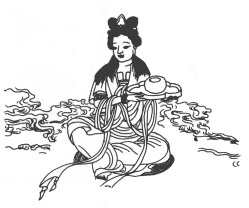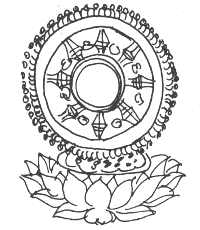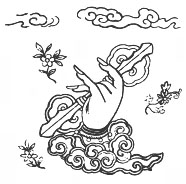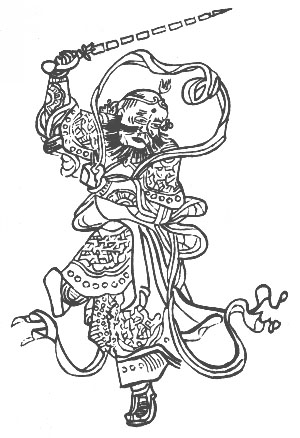|
The
next day after lunch we bowed across Branciforte Creek and the reporter
appeared again. She looked apologetic and flustered. Another student stood
beside her, a hostile expression on her face.
"I
feel embarrassed to ask you these questions, but I have to ask
anyhow," she said. The questions were all about politics and
economics. They were pointed questions and the language was angry,
resentful, full of jargon and political rhetoric. It was clear that the
reporter had been under attack by political classmates at school. They had
pegged Buddhism as parasitical and exclusive and San Bu Yi Bai as an
elitist and frivolous exercise, of interest and of benefit only to members
of a rich, white minority in society.
The
militants did not pick their opponent well. Heng Chau's answers left the
students speechless; the reporter speechless with delight, her angry
friend speechless with dismay. Heng Chau is not politically ignorant or
naive. Rather he is experienced at the political-consciousness parlor
game. Before he left home to become a monk he was a Doctoral
candidate in the highly competitive history department at the University
of Wisconsin. He cut his political teeth during the red-hot Sixties, the
era of marches, sit-ins and consciousness-raising confrontations. It was
precisely his disenchantment with the ineffectiveness and the narrow scope
of the political answer to the world's problems that led to his discovery
of Buddhism. In the Buddhadharma he found real solutions to the suffering
that all people undergo. He left the home-life to study and practice the
Dharma full-time as a monk.
Here
are the questions and answers given that day as the monk met the challenge
of the militants:
Q: What is the
racial and class background of the members of the Sino-American Buddhist
Association?
A: We come from the
class of all living beings. SABA is truly international. The
Buddhadharma cuts across all divisions of class, race, sex, age,
nationality, ethnic and economic backgrounds. It is the direct
mind-to-mind language, the teaching of all beings, the teaching of the
heart. It is the true classless origin of human beings. No one in SABA
thinks in those divisive categories any longer.
Q: How can you
avoid the reality of "those categories"?
A: It's all made
from the mind. If you want to see the world as rich and poor, black and
white, have and have not, then that's how it is. But if you take a step
two inches to the left or two inches to the right or look over your
shoulder then it all looks different. If you are open to all the
possibilities, if you turn your head all the way around then you approach
the Buddhist view. Buddhism is the teaching of the mind and all its
states. Both have no beginning and have no end.

Q:
How can you feel comfortable taking the time to make a pilgrimage like
this? No one in the Third World could afford it. Third World people have
more primary concerns, like filling their bellies. Your pilgrimage is
possible only in a country where everyone gets to eat his fill. Only
then are you able to sit around and think of transcendental bliss.
A: No one who
understands people could say that the only concern of any person or group
of people is filling their bellies. That's just a handy label that
Westerners use to identify "the Third World" as they call it. In
fact, Third World people are people. They think of birth and death, where
they came from and where they are going. All people think about it. We
just returned from a trip through Asia and we visited some backwater
places, where the Third World lives. People there met the Buddhadharma
with an overwhelmingly positive response, as strong and as enthusiastic as
anywhere in the U.S.A. Why? Because Buddhism is the language of the heart.
Everyone recognizes it. It transcends the simple concern for a full
belly. Buddhism is our original home. The rest is superficial.
Q: How are you
adding to the world's production? Living like soft parasites in a safe
monastery how are you helping anyone?
A: People at Gold
Mountain Monastery and the City of Ten Thousand Buddhas, and at the
International Institute for the Translation of Buddhist Texts are deeply
concerned with the suffering of beings everywhere. We believe that we
must,
"Truly
recognize your own faults, don't discuss the faults of others. Other's faults are
just my own. Being of one substance with everyone, This is truly great
compassion."
But we don's just
talk about it. So we eat just one meal a day. Some of the monks eat just
one bowl of food per day. Why? Because there people in the world who do
not get enough to eat every day. We add to production by not being greedy.
We
do not solicit anything. All that we have and use are offerings given
freely. We do not use money for food. We get our vegetables from what the
markets throw away, or we grow it in our fields. We live on the scraps of
the U.S.A. Any money that is offered is used to build Way-places and to
print books. No one holds private property; it all belongs to the church.
Our clothes are not bought. We recycle the clothes that other people no
longer want. We are not concerned with stylish appearances. There are no
waterbeds at our way places. Most of the monks and nuns and even some of
the lay people never lie down they sleep sitting in meditation posture. We
don't turn on heaters in our monasteries, no matter what season it is. We
do nothing for name or for gain. We do not lead personal lives. The monks
and nuns are celibate, they believe in eliminating all selfish desires.
Now this is genuine revolution. Our Three Great Principles are these:
"Freezing
to death,
we
do not climb on conditions.
Starving
to death,
we
do not beg.
Dying
of poverty,
we
do not scheme.
We
accord with conditions
but
do not change.
Unchanging,
we
accord with conditions.
These
are our Three Great Principles.
We
give up our lives
to
do the Buddhas work.
We
shape our lives to create the ability
to
make revolution within the Sangha order.
Our
business is illuminating principles
so
that our principles are revealed
in
our practice.
In
this way we carry out
the
pulse of the Patriarch's
heart-transmission."
When we follow
these principles we truly help the Third World and all living beings. The
answer to the world's suffering is not simply to give the Third World what
the U.S. has. Rather we must turn our abundant blessings into merit and
virtue through hard work and cultivation of our own natures. It's said
that
"To
receive suffering
is
to end suffering.
To
cash in blessings
is
to exhaust blessings."
The
Buddhadharma teaches that the reason the world is in a mess is because our
winds are a mess. If we want to clean up the world we must first
purify our own minds. We do not tell other people to wash their dirty
clothes. Buddhists do our own dirty laundry. All of the problems in the
world come from selfishness and the desire for self-benefit. The heart of
Buddhism teaches us to have
no self.
Now if you have no more questions I'll get back to work
bowing." said Heng Chau, and that ended the interview.
Part II
On
Sunday afternoon Heng Chau told me the story of his encounter with the
students. He said, "I gave some thought to my answers and there was
much more I could have said. But that was not the time or place to go into
depth. I would explain the principles of compassion and cause and
effect. These two principles really expanded my own mind from my former
materialist and divisive political views. My thinking used to be really
narrow. It was purely intellectual. The materialist view is
one-dimensional, it divides the world, it's based on fighting. Either side
of the coin, capitalism or communism, both are dead ends. There's no heart
there. People are not as simple as mouths and bellies and greed for
wealth.
That's
what led me to change my mind. I looked into my own heart and realized
that there was more inside than concern for my own benefit. How could I
assume that that's all there is in others? Buddhism is based on kindness,
compassion, joy and giving. It includes everyone, no one is excluded.
Great compassion is grand and magnanimous; great division is petty and
full" of hatred.
What
does our teacher have to say about class? He says:
"All
beings are my family,
all
the universe is my body,
empty
space is my school,
the
invisible is my name,
kindness,
compassion, joy and giving
are
my functions."
After
you hear this truth who could ever be satisfied with class struggle and
washing others' dirty clothes?
I
understand now that it's cause and effect that determines the worlds that
we live in. If you waste your blessings and don't cultivate merit and
virtue then even if you have wealth you can loose it in this lifetime. If
you do nothing but exhaust your blessings and follow greed then in the
next life you will certainly come up short. This is what's really going on
beneath the surface of the materialistic world.
"It's
not difficult to see beyond the purely political view of the western
intellectual," said Heng Chau. It's got no heart to it. There is a
really arrogant and superior attitude towards people within it. The basic
assumptions are that poor people are worse off than we are and won't be
happy until they have what rich Americans want. If you see the world that
way then that's how it is. It's a blend of greed and guilt. If the Third
World does not want what we have then how does it make us feel about our
excess? Are two cars and a color t.v. really our righteous share?
In
Asia I heard many people, particularly older people say that as their
countries gave up simple lives and moved closer to big cities, everyone
got more nervous. There was no time to enjoy life anymore. All people knew
was chasing the buck, desires grew, simple toys, simple thoughts no longer
satisfied people. Families break down, headaches and problems increase as
soon as First World culture is imported.
"What's
more, the Buddhadharma faces squarely the big matter of birth and death
and its suffering. Poor people embrace the Dharma because they see the
emptiness of life and the universality of suffering up close. They aren't
cushioned from it the way we are in the West," said Heng Chau.
"The
turning point in the encounter with the students came when I explained the
actual practices of the members of SABA. Up to that point the interviewers
assumed that we were just students too, wearing funny clothes and playing
the same political game. They assumed that we ate the same food, listened
to the same music, danced to the same rhythms. When they heard about the
bitter practices of SABA's Dharma-revolutionaries the conversation quickly
became very real. Great compassion is such a wonderful heart. As soon as
you include all beings instead of dividing them up, discrimination and
hatred just shrivel up," Heng Chau said. "Like the Master told
us in L.A., once you grasp any of the fundamental Buddhist principles then
there's no one you can't win over in debate. Who can refuse to stand
inside the peace and happiness of the Buddha's light? The Buddhadharma is
truly the highest of all teachings. It is "without sophistry";
it "goes beyond words and thoughts". It's
inconceivable!"

Disciple
Kuo Chen (Heng Sure)
bows
in respect
Monday
November 13, 1978
Scott
Creek, California
"Heard you are sick...hope you die."
Dear Shihfu,
Today the Master
and a bus full of bright-eyed Dharma friends came from the City of Ten
Thousand Buddhas to give the bowing monks "a little gasoline" as
the Master put it. How did we run out of fuel? I ran out of fuel by
running outside looking for women. I ran and ran until my fuel was gone.
Then I got sick. When the Master stepped down from the yellow dragon bus
he started whisking away our obstacles and afflictions. "I heard from
Xuo Chou you were sick. I asked him if you had died. He said no. So
because you haven't died yet, I have come to see you. If you had died I
wouldn't have come. Do you understand?" The Masters strange words
went straight to my heart. Finally, I understood. This is the whole story:
I
should have left home the first time I came to Gold Mountain Monastery
almost three years ago. I had come home and knew this was where I
belonged. But I couldn't put down my selfish desire for women. So I turned
my back on enlightenment and went back to the dust. The purity and
happiness I experienced at Gold Mountain soon was exhausted. Shortly
after, I got all afflicted and hung-up, trying to act like a monk at
home. I was cultivating the Way and romance at the same time. It didn't
work. At the peak of this self-inflicted crisis, with my girlfriend
threatening to leave, I called Shihfu expecting sympathy. The Master
wasted no words or phony emotion... "SO!? So she leaves. Good.
No one is dying are they? Don't have any false thoughts or
attachments." The Master warned me to be careful and act according to
principle. I did not listen. I just couldn't cut off my desire and so
things got worse and my sickness drained my strength.
When
I left home the Master remarked, "I believe you can leave home and
cultivate the Way because you have put down your girlfriend. Be vigorous
and advance!" Then Shihfu addressed all the monks present informally
and kindly, "You can't be sloppy or casual, especially now in
America. This is the only way Buddhism will be established in the West.
Most important, don't attach to women...that is the most important example
for you to show America. You can't be too close to women or too far away
or you're wrong. You are all my precious jewels. I won't sell anyone of
you. Don't waste your light-treasure!" Did I understand? No.
All
throughout the bowing pilgrimage my false thoughts about women brought a
hornet’s nest of troubles. Bad dreams and demons, harsh weather and
hassles all came because of this mau bing (sickness) of mine. In Santa
Barbara while false thinking about an old girlfriend a lemon flew off of a
passing garbage truck and hit me in the jaw, sending me to my knees. I
said to myself, "Just a coincidence. If it really hit me because of
my mind for women then if I keep on thinking about them it should happen
again." So I went on wondering if my old girlfriend had found another
man and ZAP! Another lemon hit me square in the back knocking me down
again! Later the Master said, "Those sour lemons were from your sour
thoughts about your girlfriend. Now that you know your
false-thinking isn't ok, don't do it anymore." Did I understand? No.
In
Malaysia I couldn't subdue my eyes or thoughts and got turned up side
down. But this time my fuel reserves of merit and virtue were used up. I
got so sick as a result of scattering all my energy by false thinking
about women I nearly died. Shihfu saved my life and brought me back from
King Yama in Malacca. While I was bedridden I saw clearly as never before,
in my dreams and waking thoughts, that sexual desire is the root of birth
and death. The Master would come to my bed, rub my head and recite
mantras, at the critical times, breaking the fever and purging toxins. All
the while he kept smiling and asking, "Good, good. Did you die yet?
Are you going to die?" In Singapore and Hong Kong the cause and
effect of my false thinking about women and getting sick was uncanny and
undeniable. Less than an hour after my mind would move I would become
sick. The Master kept saying, "Sick again? Good. I hope you die
soon." Did I understand? I thought so. But habits are stubborn and my
ignorance deep. It's hard to "die" even when you try your best.
Never again I vowed, never again.
When
we returned to the U.S., Heng Sure and I began bowing near Santa Cruz. We
went into town to contact and inform the police of our journey.
Surprise! The cop was a woman. I got turned and started smiling and
rapping with her. That night I took ill again. Either my mind for women
was going to die or I was. It now was clear to me that all desire was just
sexual desire. Running outside one's own nature and seeking anything
is death—the slow death of outflowing. Literally, the blessings and
wisdom of the original nature dribble away until all that is left of one's
bright Dhanna jewel is dog shit. It is just like it says in the
Avatamsaka:
"Moreover,
living beings
are
bound in the net of love.
They
are covered over with ignorance
and
attached to their existence.
They
follow it and cannot give it up.
They
enter into a cage of suffering
and
do the deeds of demons.
Their
blessings and wisdom are exhausted
and
they forever harbor doubts.
They
do not see
the
place of peace and tranquility.
They
do not know the path of escape,
and,
without rest,
they
turn on the wheel of birth and death.
They
constantly bob and sink
in
the suffering mud."
I've had a lot of
time while slowly recovering in the back of the Plymouth to reflect on my
"sickness" and how to get well. What I took for happiness in the
world is really suffering and what I once thought to be suffering
(cultivating) is really happiness. Things aren't always what they seem. So
it says,
"I
do not seek the unsurpassed Path for myself, nor do I cultivate Bodhi
Practices in order to seek the states of the five desires or the many
kinds of bliss in the three realms of existence. Why?
Of
all the happiness in the world, there is none which is not
suffering..."
Avatamsaka
Man,
that is straight talk! In my heart, in ways no words could express,
I now know this is so. This is what the Master meant when he asked when I
was going to "die". His words were full of compassion and
wisdom. It is the false mind that runs outside after desire that must die
to cure the sickness of birth and death. The Master's words were the
finest of medicines. "When your mind for women dies then you
can be free. If you can't kill it when you'll always be locked up in a
cage. Do you understand?"
"Yes
Shihfu," I answered, "I tried to but I didn't quite pull it
off."
I'm
a lousy teacher. I can't teach and transform my disciples. All I can do is
talk unlucky talk and say I wish they would die."

I write to tell the whole story so no one will think the Master's words
were inauspicious. I am a lousy disciple. Even after the Master saved my
life I can't man age to die. So Shihfu and all our Dhanna friends braved
the cold and rain to bring a little gas to the bowing monks. "Try
your best" grinned the Master as everyone climbed back aboard the
bus. A storm that had been gathering suddenly broke up and the sun shone
down on all of us. I was so full I wanted to cry. Truly we are all
one heart bowing to the City of Ten Thousand Buddhas! Then I had the
thought, "Just try your best, Kuo Ting. Don't cry, just die."
Like Bodhidharma with the bird in the cage the Master has showed me a way
to escape from the cage. But "mistaking what's before my
eyes..." I fly back in, taking the cage for a palace. Hence the name,
Heng Chau. Truly a "monk in the cage".
|



